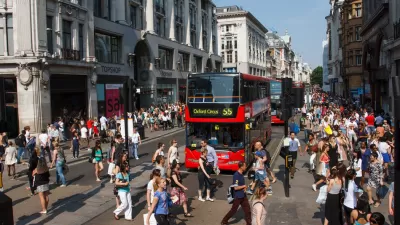Cities across the developing world are dealing more with rising obesity rates as urbanization occurs, reports TheCityFix's Jonna McKone.
In cities, the increased consumption of low-cost and accessible processed foods has supplanted more traditional diets that offer a better micronutrients. There are also disparities in access to food, sometimes resulting in urban "food deserts," where food supermarkets are rare, understocked or overpriced, which further encourages or necessitates the need to drive a car in order to eat healthy food. Food advertisements, also more prevalent in cities, are targeted specifically at children, literally feeding the addiction to unhealthy food. What's more, city life can more often mean a family of two income earners that have less time to prepare food for their families.
The transition away from physical labor, too, results in a loss of physical activity and weight gain. But even in rural areas, the rise in obesity is a problem. Farmers, for instance, who use mechanical farm equipment and may grow one type of crop as opposed to a diversity of vegetables, live in isolated areas where there is often easy access to highly processed food.
The number of overweight individuals now rivals the number of underfed people on the globe. The irony of obesity is that "while some of the poor are becoming plumper, they are not necessarily better fed," says the Food and Agriculture organization of the United Nations. "Obesity often masks underlying deficiencies in vitamins and minerals."
Thanks to Garrett Bradford
FULL STORY: Obesity Poses a Heavy Problem for Developing Cities

Study: Maui’s Plan to Convert Vacation Rentals to Long-Term Housing Could Cause Nearly $1 Billion Economic Loss
The plan would reduce visitor accommodation by 25% resulting in 1,900 jobs lost.

Alabama: Trump Terminates Settlements for Black Communities Harmed By Raw Sewage
Trump deemed the landmark civil rights agreement “illegal DEI and environmental justice policy.”

Why Should We Subsidize Public Transportation?
Many public transit agencies face financial stress due to rising costs, declining fare revenue, and declining subsidies. Transit advocates must provide a strong business case for increasing public transit funding.

Paris Bike Boom Leads to Steep Drop in Air Pollution
The French city’s air quality has improved dramatically in the past 20 years, coinciding with a growth in cycling.

Why Housing Costs More to Build in California Than in Texas
Hard costs like labor and materials combined with ‘soft’ costs such as permitting make building in the San Francisco Bay Area almost three times as costly as in Texas cities.

San Diego County Sees a Rise in Urban Coyotes
San Diego County experiences a rise in urban coyotes, as sightings become prevalent throughout its urban neighbourhoods and surrounding areas.
Urban Design for Planners 1: Software Tools
This six-course series explores essential urban design concepts using open source software and equips planners with the tools they need to participate fully in the urban design process.
Planning for Universal Design
Learn the tools for implementing Universal Design in planning regulations.
Smith Gee Studio
Alamo Area Metropolitan Planning Organization
City of Santa Clarita
Institute for Housing and Urban Development Studies (IHS)
City of Grandview
Harvard GSD Executive Education
Toledo-Lucas County Plan Commissions
Salt Lake City
NYU Wagner Graduate School of Public Service





























